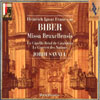Biber Missa Bruxellensis
The first recording of a major mass setting by Biber, not on the same level as his Salzburg setting, but given powerful advocacy by Jordi Savall who makes it an event
View record and artist detailsRecord and Artist Details
Composer or Director: Heinrich Ignaz Franz von Biber
Genre:
Vocal
Label: Alia Vox
Magazine Review Date: 3/2000
Media Format: CD or Download
Media Runtime: 52
Catalogue Number: AV9808

Tracks:
| Composition | Artist Credit |
|---|---|
| Missa Bruxellensis |
Heinrich Ignaz Franz von Biber, Composer
(Le) Concert des Nations Catalan Capella Reial Heinrich Ignaz Franz von Biber, Composer Jordi Savall, Conductor |
Author: Jonathan Freeman-Attwood
Modern technology and expert engineering allow us to bask in Biber's magnificent-sounding and spaciously conceived masses, complete with all the glistening attention to detail, the visceral tutti impact and the delicate textural contrasts which constitute some of baroque music's most opulent expressions of earthly potency. Salzburg Cathedral provided exceptional acoustical possibilities. As with the Missa Salisburgensis, which has recently been recorded successfully by both Paul McCreesh (Archiv, A/98) and Ton Koopman (Erato, 11/99), Biber, in his Missa Bruxellensis could satisfy the potentate by adorning the unique status of Salzburg as the court with everything. The problem, however, with Missa Bruxellensis - so called because it was discovered in Brussels - is that it is an altogether less satisfying musical creation; Salisburgensis is not entirely without its moments of blandness, but the Bruxellensis appears to serve its purpose more as a professional job than as a vehicle for extended inspiration.
Even so, a world premiere recording of a monumental work by a major composer is not to be sniffed at, especially when directed by Jordi Savall, who has the knack of casting fresh light on any musical mosaic that catches his fancy (such has been the case in many discs from his kaleidoscopic and beautifully produced Alia Vox series). Savall lets Biber's score roll out unassumingly; even if at the expense of fine tuning and exacting ensemble (hear the unison start of the Sanctus for leeway!), the final sections of the Credo are immensely stylish, and the 'Miserere' from the Gloria has the dignity of a spontaneous event rather than a contrived vignette. The recorded sound is something of a mixed success, taken (as was Koopman's recording of the Missa Salisburgensis) from sessions held in the original location; there is a natural sense of the cathedral acoustic as one would experience it (as long as you bagged the Archbishop's throne), though not, happily, at the expense of immediacy in the solo sections. Less satisfactory are the strident upper frequencies, in particular the solo sopranos whose shrillness is exacerbated by the high pitch of A=465.
A few gripes aside, this will delight collectors who relish these fortress-like recordings. Not all batteries of trumpets on the right flank and echoes of shot in the rafters, but there's a good deal of it - possibly because the works may have been written in 1701 to mark the foundation of the Order of the Knights of St Rupert, an aristocratic military elite.'
Even so, a world premiere recording of a monumental work by a major composer is not to be sniffed at, especially when directed by Jordi Savall, who has the knack of casting fresh light on any musical mosaic that catches his fancy (such has been the case in many discs from his kaleidoscopic and beautifully produced Alia Vox series). Savall lets Biber's score roll out unassumingly; even if at the expense of fine tuning and exacting ensemble (hear the unison start of the Sanctus for leeway!), the final sections of the Credo are immensely stylish, and the 'Miserere' from the Gloria has the dignity of a spontaneous event rather than a contrived vignette. The recorded sound is something of a mixed success, taken (as was Koopman's recording of the Missa Salisburgensis) from sessions held in the original location; there is a natural sense of the cathedral acoustic as one would experience it (as long as you bagged the Archbishop's throne), though not, happily, at the expense of immediacy in the solo sections. Less satisfactory are the strident upper frequencies, in particular the solo sopranos whose shrillness is exacerbated by the high pitch of A=465.
A few gripes aside, this will delight collectors who relish these fortress-like recordings. Not all batteries of trumpets on the right flank and echoes of shot in the rafters, but there's a good deal of it - possibly because the works may have been written in 1701 to mark the foundation of the Order of the Knights of St Rupert, an aristocratic military elite.'
Discover the world's largest classical music catalogue with Presto Music.

Gramophone Digital Club
- Digital Edition
- Digital Archive
- Reviews Database
- Full website access
From £8.75 / month
Subscribe
Gramophone Full Club
- Print Edition
- Digital Edition
- Digital Archive
- Reviews Database
- Full website access
From £11.00 / month
Subscribe
If you are a library, university or other organisation that would be interested in an institutional subscription to Gramophone please click here for further information.




